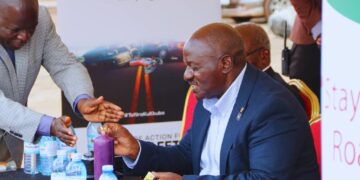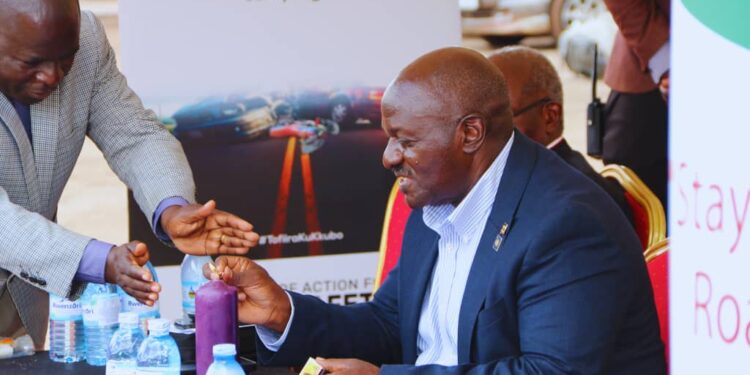The Minister for Works and Transport Katumba Wamala, marked the World Day of Remembrance for Traffic Crash Victims in Uganda, with a call to action for all Ugandans to play a role in supporting Government to improve the road safety situation in the country.
General Katumba, while addressing the gathering at a memorial function hosted by the Uganda Professional Drivers’ Network (UPDN) working with their Civil Society Coalition of Road Safety NGOs in Uganda-ROSACU at Namayiba Bus Park, reiterated that everybody has a share of the burden in combatting the problems of road crashes which have consistently been on a sharp rise in Uganda.
“Today, we reflect on an issue that affects us all the devastating impact of road crashes,” Gen Wamala said.
“Road crashes cause loss of life, disabilities, and emotional trauma, leaving a ripple effect on families and communities including our national economy with a current estimated burden on Government expenditures through the health sector taking up to 5% of Uganda’s GDP.”
As part of the United Nations’ initiative, Uganda has pledged to reduce road traffic deaths and injuries by 50% by 2030 under SDG 3.6 and 11.2.
However, the minister stressed that this could only be achieved through collective responsibility.
“Road safety is a shared duty,” he remarked. “It is not enough to rely on law enforcement alone; each road user must adhere to traffic laws and exercise caution.”
The minister also pressed for broader involvement of corporate entities, media, and religious bodies to advocate for road safety.
He commended organizations like the Uganda Professional Drivers’ Network, Private Sector Foundation Uganda, Marinetime Cargo, ROSACU, Inter-Religious Council of Uganda, The Bloomberg initiative for road safety that is supporting road safety initiatives within Kampala City.
Winstone Katushabe, the Commissioner in-charge Transport Regulation and Safety added to the minister’s call and said that in addition to the ministry’s efforts to reduce road crashes, they are introducing an intelligence-based transport management system and fine issuance protocols.
Most importantly the Ministry of Works and Transport, according to the commissioner committed to pass and gazette the reviewed Speed Limits Regulations 2024 that had delayed before end of the year.
He concluded by thanking development partners like the Global Road Safety Partnership (GRSP), Global Health Advocacy Incubator (GHAI) among others for their relentless support for both the road safety civil society organisations and Government through the Ministry of Works and Transport to enable Uganda improve on the road safety legal and policy environment in Uganda, especially targeting the key behavioural risk factors.
This annual event commemorated in Uganda every 3rd Sunday of November, is globally coordinated by UPDN since 2019.
The Executive Director at UPDN, Omongo Ndugu raised concern over lack of involvement for local governments and urban authorities which are largely in charge of their local roads and road safety management.
He said the country would achieve limited impact without meaningful involvement of local government authorities to complement the currently over centralised road safety management.
Gen. Wamala mentioned that they would soon resume routine vehicles inspections, and the strict enforcement of the provision on key risk factors including Speeding, Blood Alcohol Content, Helmet use, Seatbelts and child restraints.
Police Director of Traffic and Road Safety, Nuwabiine Lawrance also highlighted the efforts of the Traffic Police, who, through research and data collection, have gathered essential information on road safety.
He appealed to the public to listen to the traffic police and underscored the responsibility of urban authorities, criticizing their failure to follow ministerial directives, such as removing roadside markets that obstruct traffic.
“We have to admit, that pedestrians take the second place in road accident deaths after motorcyclists, this includes those doing businesses on road sides. We have had it with seeing the mass of people who are daily disabled as a result of these scuffles. This hurts labour productivity and the general economy development of the country as well,” he said.
He added that Road users are human beings, full of contradictions and stubbornness, and need a comprehensive monitoring system to change their behaviour.
Msgr. Charles Kasibante, and Sheikh Mohammed Ali Waiswa from the Uganda Muslim Supreme Council noted Ugandans should remember to make God their priority when traveling.











